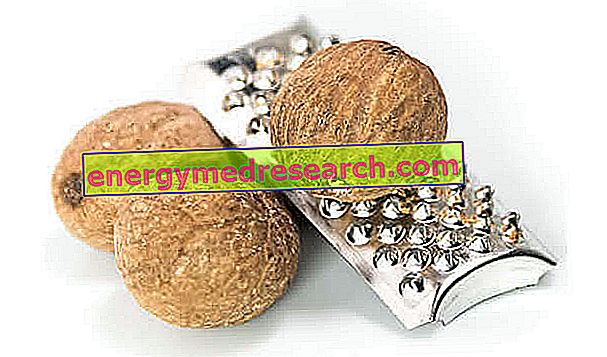What is the Nutmeg
Nutmeg is one of the most well-known and appreciated spices, given that its characteristic hot-sour taste goes perfectly with dishes based on milk and cheese, mashed potatoes, game, sauces, broths, vegetables (especially spinach, asparagus and mushrooms). ) and pasta.
Botanical outline
Nutmeg is given by the seeds of Myristica fragrans, an evergreen tree native to the Moluccan islands, now widely cultivated in Indonesia itself, in the Antilles, Malaysia, the island of Grenada and in various tropical regions. The fruits of this tree are similar in shape to apricots and contain a seed which - due to its musk-like aroma - has been called and is still known as nutmeg.
On the market it is possible to find both whole seeds, to be grated at the time of use so as not to disperse the aroma, and powder, which is less precious also from an organoleptic point of view. The integument that surrounds the seeds is removed and constitutes the mace, a spice with similar gastronomic uses.

Health risks
At high doses, higher than 2-8 grams (in relation to individual sensitivity, body size and age), nutmeg causes fever, nausea vomiting, considerable nervous excitement, up to serious mental disorders.
In fact, this spice has an inhibitory activity on monoamine oxidases (enzymes involved in the degradation of excitatory neurotransmitters such as serotonin) and prostaglandins (mediators of the inflammatory response).
The hallucinogenic effects are traced to the presence of two active compounds: myristicin and elemicina, whose chemical structures are very similar to those of synthetic amphetamines, although the effects closely follow those of LSD.
Particular caution in the use of nutmeg during pregnancy (granted in small doses) and in individuals treated with psychotropic drugs (such as the Mono-Amino-Oxidase Inhibitors).
Healing properties
Due to the numerous side effects that occur at high doses, nutmeg has no place in modern phytotherapy.
According to popular medicine, however, the spice - for its stimulating, astringent, sedative and carminative properties - is useful as an appetite stimulant, including sexual stimulation, and as a tonic against tiredness and physical asthenia . Antiseptic properties are also described - useful against intestinal infections and some forms of diarrhea - while the carminative action of nutmeg would make it useful for air accumulated in the stomach and intestines.
To learn more, read: Nutmeg in Herbal Medicine »



